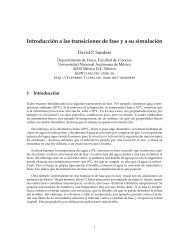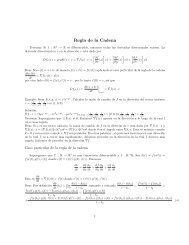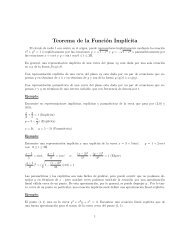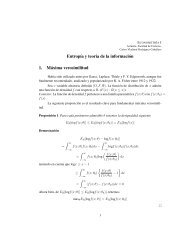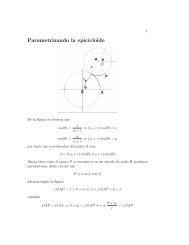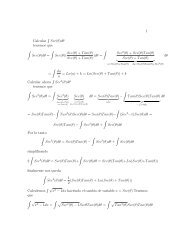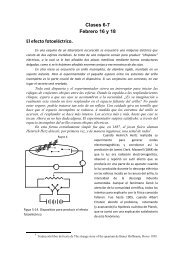"Surely You're Joking, Mr. Feynman!" - unam.
"Surely You're Joking, Mr. Feynman!" - unam.
"Surely You're Joking, Mr. Feynman!" - unam.
Create successful ePaper yourself
Turn your PDF publications into a flip-book with our unique Google optimized e-Paper software.
expansion, they would have found it. Then I come along and try differentiating under the<br />
integral sign, and often it worked. So I got a great reputation for doing integrals, only<br />
because my box of tools was different from everybody else's, and they had tried all their<br />
tools on it before giving the problem to me.<br />
Mindreaders<br />
My father was always interested in magic and carnival tricks, and wanting to see<br />
how they worked. One of the things he knew about was mindreaders. When he was a<br />
little boy, growing up in a small town called Patchogue, in the middle of Long Island, it<br />
was announced on advertisements posted all over that a mindreader was coming next<br />
Wednesday. The posters said that some respected citizens the mayor, a judge, a banker<br />
should take a fivedollar bill and hide it somewhere, and when the mindreader came to<br />
town, he would find it.<br />
When he came, the people gathered around to watch him do his work. He takes<br />
the hands of the banker and the judge, who had hidden the fivedollar bill, and starts to<br />
walk down the street. He gets to an intersection, turns the corner, walks down another<br />
street, then another, to the correct house. He goes with them, always holding their hands,<br />
into the house, up to the second floor, into the right room, walks up to a bureau, lets go of<br />
their hands, opens the correct drawer, and there's the fivedollar bill. Very dramatic!<br />
In those days it was difficult to get a good education, so the mindreader was hired<br />
as a tutor for my father. Well, my father, after one of his lessons, asked the mindreader<br />
how he was able to find the money without anyone telling him where it was.<br />
The mindreader explained that you hold onto their hands, loosely, and as you<br />
move, you jiggle a little bit. You come to an intersection, where you can go forward, to<br />
the left, or to the right. You jiggle a little bit to the left, and if it's incorrect, you feel a<br />
certain amount of resistance, because they don't expect you to move that way. But when<br />
you move in the right direction, because they think you might be able to do it, they give<br />
way more easily, and there's no resistance. So you must always be jiggling a little bit,<br />
testing out which seems to be the easiest way.<br />
My father told me the story and said he thought it would still take a lot of practice.<br />
He never tried it himself.<br />
Later, when I was doing graduate work at Princeton, I decided to try it on a fellow<br />
named Bill Woodward. I suddenly announced that I was a mindreader, and could read his<br />
mind. I told him to go into the "laboratory" a big room with rows of tables covered<br />
with equipment of various kinds, with electric circuits, tools, and junk all over the place <br />
pick out a certain object, somewhere, and come out. I explained, "Now I'll read your<br />
mind and take you right up to the object."<br />
He went into the lab, noted a particular object, and came out. I took his hand and<br />
started jiggling. We went down this aisle, then that one, right to the object. We tried it<br />
three times. One time I got the object right on and it was in the middle of a whole<br />
bunch of stuff. Another time I went to the right place but missed the object by a few<br />
inches wrong object. The third time, something went wrong. But it worked better than I<br />
thought. It was very easy.<br />
Some time after that, when I was about twentysix or so, my father and I went to



